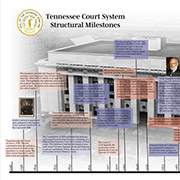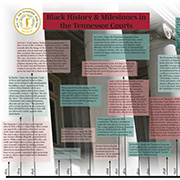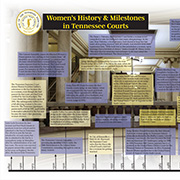1796
|
 |
Tennessee’s first constitution is written, and on June 1 President George Washington signs a bill admitting Tennessee as the 16th state in the Union. The constitution did not include a judicial branch of government. Instead, the creation and management of the court system was left to the legislature. Tennessee’s first legislature established a three-person Tennessee Superior Court, with judges to be elected by the General Assembly. Unlike the modern Supreme Court, the Superior Court was both a trial court and an appellate court. |
1798
|
 |
Andrew Jackson is appointed and confirmed to the Superior Court. Jackson would serve on the Court until 1804 |
1809
|
 |
The Tennessee legislature abolishes the Superior Court, creating a new Supreme Court of Error and Appeals, which will act strictly as an appellate court. The legislature also splits the state up into five judicial circuits and creates a system of circuit courts to hear “all matters and causes at common law and in equity.” |
1835
|
 |
The Constitution of 1835, the result of a constitutional convention the previous year, establishes the Judiciary as a coequal branch of government, consisting of a three-person Supreme Court and a system of lower courts set up by the General Assembly. Separate circuit and chancery courts are established. Today, Tennessee is only one of five states to have chancery courts. Learn more about chancery courts in this podcast. |
1853
|
 |
Tennessee voters ratify an amendment requiring the popular election of all Supreme Court and lower court judges. This ended the practice of the General Assembly electing justices to the Supreme Court |
June 8
1861
|
 |
Tennessee secedes from the Union. The business of the courts in Tennessee is severely disrupted during the War, with the Supreme Court rarely holding sessions early in the War and not at all after March 1862. |
1866
|
 |
The Tennessee General Assembly votes to ratify the 14th Amendment, making Tennessee the third state to do so. The state rejoined the Union soon after. |
1868
|
 |
Horatio Nelson Rankin becomes the first African American lawyer in Tennessee. He is admitted to the bar in Memphis. |
1870
|
 |
The Constitutional Convention is held in January, and voters approve the new 1870 constitution in March. Under the terms of the constitution, the Supreme Court is enlarged to five justices, popularly elected to eight-year terms, with a limit of two from any of the state’s grand divisions. |
1897
|
 |
Lutie Lytle becomes the first woman and first black female to graduate from law school and be admitted to the bar in Tennessee. She attended Central Tennessee College. Her efforts to join the bar are rebuffed by several courts, but she is admitted to the bar by a sympathetic judge in Memphis, after the administration of an oral bar exam. The news was reported in papers around the country and as far away as England. Shortly after, she moves from Tennessee. |
1900
|
 |
The Tennessee Supreme Court denies Marion Scudder Griffin’s admission to the bar because she is a woman, even though she had passed the bar exam and had been certified by two local judges. The Court denies her admission again in 1901. She subsequently lobbies for a bill allowing women to become lawyers. The Tennessee legislature passes such a bill in 1907, and Griffin is admitted to the bar and became the state’s first practicing woman attorney |
1903
|
 |
The General Assembly creates a Board of Law Examiners, strengthening standards for the testing and admission of attorneys. |
1907
|
 |
Tennessee voters ratify an amendment requiring the popular election of all Supreme Court and lower court judges. This ended the practice of the General Assembly electing justices to the Supreme Court |
1910
|
 |
Justice Grafton Green is elected to the Tennessee Supreme Court. He would serve until 1946, becoming the Court’s longest serving member to this day. He is also the longest serving chief justice, holding that role from 1923 to 1947. |
1911
|
 |
The General Assembly creates a statewide juvenile court system. Learn more about juvenile courts in this podcast. |
1920
|
 |
The Tennessee General Assembly provides the deciding vote to ratify the 19th Amendment, extending the franchise to many women. This vote is challenged by some Tennessee legislators, who secure an injunction from a trial judge to enjoin Governor Albert H. Roberts from certifying the vote. Chief Justice D.L. Lansden dissolves that injunction, clearing the way for ratification. Learn more about Tennessee's role in the passage of the 19th Amendment. |
1920
|
 |
Camille Kelley becomes the first woman judge in the state when she is appointed judge of the Shelby County Family Court. After she steps down in 1950, Judge Kelley is implicated in a long-running black market adoption scheme. |
1925
|
 |
The five-member Court of Civil Appeals, which had been established in 1907, is abolished, and a new nine-person Court of Appeals is created. The new Court of Appeals consists of three judges from each of the state’s three grand divisions. Learn more about the Court of Appeals. |
1931
|
 |
Judge Kate M. Drake becomes the first woman county judge in state history when she is appointed to the bench in DeKalb County. She is appointed to fill the seat following the death of her husband, who had been the county judge for 20 years, but she goes on to win election to a full two-year term as county judge in 1932. She loses reelection in 1934. |
1937
|
 |
The General Sessions Court of Davidson County, the first general sessions court in the state, is created by the General Assembly and vested with the powers previously given to the county’s justice of the peace. Many more general sessions courts would be established in the coming years. The creation of the court and the transfer of justice of the peace powers to it are upheld by the Supreme Court in Hancock v. Davidson County this same year. |
Dec. 4
1937
|
 |
A new Supreme Court building opens on 7th Avenue in Nashville. The 56,000 square foot building cost around $750,000, a significant portion of it paid for with funds from the Public Works Administration. |
1953
|
 |
Governor Frank G. Clement signs a bill establishing the Tennessee Judicial Conference, an organization composed of all of the state’s judges on courts of record. Tennessee Supreme Court Chief Justice A.B. Neil is named the Conference’s first president. The TJC continues to operate and meet today. |
1965
|
 |
Judge Benjamin Hooks becomes the first African American judge in state history when he is appointed to the Shelby County Criminal Court by Governor Frank Clement. He wins election to the seat in 1966 and steps down from the bench in 1968. Later in his career, he would serve for five years as commissioner of the Federal Communications Commission and as executive director of the NAACP. Learn how the Black bar associations helped propel the careers of many early minority attorneys and judges. |
1967
|
 |
The Court of Criminal Appeals is created to hear criminal cases on appeal from the trial court level. Learn more about the Court of Criminal Appeals. |
April 8
1969
|
 |
Judge Adolpho A. Birch Jr.’s long and distinguished judicial career begins when he is appointed to the Davidson County General Sessions Court, becoming the first African American General Sessions judge in the state. Judge Birch would stay on the General Sessions bench until 1978, when he became the first African American criminal court judge in state history after he was appointed to the 20th Judicial District Criminal Court |
1975
|
 |
Judge Martha Craig Daugthrey becomes the first woman judge on a court of record in the state when she is appointed to the Court of Criminal Appeals by Governor Ray Blanton. She will serve on the Court for the next 15 years. |
June 23
1980
|
 |
Justice George Brown becomes the first African American justice on the Tennessee Supreme Court after his appointment by Governor Lamar Alexander. He loses an election to the seat later that year. Justice Brown is subsequently elected to the 30th Judicial Circuit Court bench in 1983, and serves as a judge there until his retirement from the bench in 2005. |
1981
|
 |
Judge Julia Smith Gibbons becomes the state’s first woman trial court judge when she is appointed as circuit judge in the 15th Judicial Circuit. She wins election to that seat in 1982, but leaves the circuit court bench in 1983 when President Ronald Reagan appoints her to the United States District Court for the Western District of Tennessee. In 2002, President George W. Bush appoints her to the United States Court of Appeals for the Sixth Circuit. |
1982
|
 |
Judge Bernice Donald becomes the first African American woman judge in Tennessee history when she is elected to the Shelby County General Sessions Court bench. She later becomes the first African American U.S. bankruptcy judge in 1988. In 1995, President Bill Clinton appoints her to a position on the United States District Court for the Western District of Tennessee. In 2011, President Barack Obama appoints her to the United States Court of Appeals for the Sixth Circuit. |
1984
|
 |
Judicial redistricting creates the basic outline of the state’s current judicial district structure. Prior to this redistricting, the state was made up of 31 judicial circuits and 17 chancery court divisions. The 1984 legislation reorganizes the judicial structure so that the chancery divisions are absorbed into the 31 judicial circuits, now called districts. While the total number of judicial circuits/districts statewide remains the same after this legislation, the composition of some of those districts changes. |
1986
|
 |
Chancellor Sharon Bell becomes the first female chancellor in Tennessee history when she wins election to Part III of the 6th Judicial District Chancery Court. She stays in that position until 2006 |
1987
|
 |
Judge Adolpho A. Birch, Jr. becomes the first African American judge in the state to sit on the Court of Criminal Appeals, after he is appointed by Governor Ned McWherter. He will stay on the Court until 1993, when he is appointed to the Tennessee Supreme Court. |
1990
|
 |
Justice Martha Craig Daughtrey becomes the first woman to serve on the Tennessee Supreme Court. She will serve until her appointment by President Bill Clinton to the United States Court of Appeals for the Sixth Circuit in the fall of 1993. Learn more about Judge Daughtrey. |
1993
|
 |
Judge Adolpho A. Birch Jr. is appointed by Governor Ned McWherter to the Tennessee Supreme Court, becoming the first judge in state history to serve at every level of the court system: general sessions, trial, appellate, and Supreme Court. The following year, he becomes the first African American justice elected to the Court as well as the first justice elected to the Court under the provisions of the Tennessee Plan. Read more about Justice Birch. |
1995
|
 |
Judge Holly Kirby becomes the first woman to serve on the Court of Appeals, after her appointment to the Court by Governor Don Sundquist. She will become Justice Holly Kirby in 2014 after Governor Bill Haslam appoints her to the Supreme Court. |
1995
|
 |
The Supreme Court Advancing Legal Education for Students (SCALES) program is created, bringing the Court’s justices to sites around the state to hold oral arguments in front of audiences of high school students. To date, well over 36,000 students from over 540 high schools have attended a SCALES event. Learn more about SCALES. |
1996
|
 |
Twentieth Judicial District Circuit Judge Seth Norman establishes the Davidson County Drug Court, a groundbreaking residential treatment program that is the first of its kind in the state and one of the first of its kind in the country. Tennessee now has dozens of recovery courts—as many of the drug courts are now called—dedicated to helping non-violent drug offenders overcome their substance use disorders and become productive members of society. |
2002
|
 |
The Supreme Court adopts Rules 41 and 42, establishing ethics and standards for court interpreters. Before these rules, there were no set standards for state court interpreters. In December 2002, the state certifies its first seven interpreters to work with non-English speakers in Tennessee courtrooms. |
2008
|
 |
Judge Richard Dinkins becomes the first African American member of the Court of Appeals, after his appointment by Governor Phil Bredesen. |
2008
|
 |
Judge Camille McMullen becomes the first African American female to sit on an appellate court when she joins the Court of Criminal Appeals. |
2008
|
 |
Justice Janice Holder is sworn in as the Tennessee Supreme Court’s first woman chief justice. She serves in this role until 2010. Chief Justice Holder will step down from the Court in 2014. |
2008
|
 |
The Supreme Court declares that expanding justice to those who cannot afford attorneys when faced with civil legal issues is its number one strategic priority. As a result, it announces the Access to Justice Initiative. Learn more about Access to Justice. |
2012
|
 |
Montgomery County General Sessions Judge Ken Goble establishes the state’s first Veterans Treatment Court to help retired or enlisted service members struggling with mental health and/or substance use issues. The Court serves a number of service members who are stationed or who have served at nearby Ft. Campbell. |
2015
|
 |
Tennessee’s first Safe Baby Court launches in Davidson County and the unique problem-solving court focused on protecting children zero to four quickly expands to Grundy and Coffee counties. Legislation championed by Tennessee Senator Ferrell Haile expands the structure to 12 counties by 2020 |
2018
|
 |
Judge Ana Escobar becomes the first Hispanic judge elected to the general sessions bench in Nashville. |
2018
|
 |
The opioid crisis dramatically impacts court dockets. Judge Duane Slone and AOC Director Deborah Taylor Tate play a pivotal role in developing a judicial response, including innovative docket strategies, educational sessions, and expanded treatment opportunities, on the national level. Tate serves as co-chair of the National Judicial Opioid Task Force, and Judge Slone is the first Tennessee judge honored with the National Center for State Courts William H. Rehnquist Award for Judicial Excellence. Read more about Judge Slone. Read more about the National Judicial Opioid Task Force. |
March 13
2020
|
 |
Tennessee’s judicial system, and the nation, face one of its biggest challenges ever with the emergence of the COVID-19 pandemic. In the first of several court orders concerning the pandemic, the Supreme Court declares a state of emergency for Tennessee courts and suspends most in-person proceedings. On April 24, the Court directs judicial districts to come up with individualized plans for the safe resumption of in-person business. Despite the periodic suspension of in-person proceedings over the next year, at no point are Tennessee courts closed for business. On the contrary, under the continuous guidance of the Supreme Court, state courts are able to maintain operations and serve the citizens of Tennessee as safely as possible throughout the pandemic. Watch our YouTube channel. |





















































